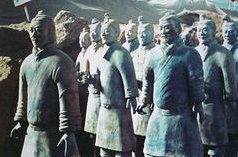One
Empire, One People
By 1173
BCE, the Shangal conquest of Terwelt [Andrea] was complete.
The few scattered clans to the far south and the nomadic tribesmen
of the central highlands would hold out for many years to come,
providing training for Shangal troops, and glory for Shangal
nobility. However, for all intents and purposes, the Shangal
Empire had dominion over the whole of Terwelt. The Emperor and
his commanders now found themselves in the position of ruling
a large subject race with a completely foreign culture, and
growing unrest. To curb this unrest and complete the subjugation of the Achean, Emperor Shan Tzu issued the General Proclamation
of the Dragon Year of his reign (1164 BCE). This proclamation
ordered that each of the soldiers who came with him to Terwelt
must take an Achean woman as his wife. Since few women hand
come with the Shangal fleet from Sung Ming, this proclamation
was immediately popular among the troops.
of the Achean, Emperor Shan Tzu issued the General Proclamation
of the Dragon Year of his reign (1164 BCE). This proclamation
ordered that each of the soldiers who came with him to Terwelt
must take an Achean woman as his wife. Since few women hand
come with the Shangal fleet from Sung Ming, this proclamation
was immediately popular among the troops.
However,
the proclamation provoked outrage among the Achean peasants,
and revolts began almost immediately. For the next five years,
the Shangal armies were forced to wage a campaign of attrition,
subduing village after village. Once the northern plains were
subdued, the southern forest regions quickly submitted as well.
As a reward, Emperor Shan Tzu granted many of the  former
Achean nobles from the south limited self rule, and a place
among the Shangal nobility -- a policy with mixed reception.
Things were starting to seem peaceful for the fledgeling Empire
until the morning of April 5, 1146 BCE.
former
Achean nobles from the south limited self rule, and a place
among the Shangal nobility -- a policy with mixed reception.
Things were starting to seem peaceful for the fledgeling Empire
until the morning of April 5, 1146 BCE.
On the
morning of April 5, 1146 BCE, Emperor Shan Tzu was in his private
temple, giving offerings to the spirits of his ancestors, as
was usual. Little did he know that he would soon be joining
them. At that very moment, a small band of Achean Keltani berserkers
where making a last ditch effort to throw off Shangal rule.
The seven warriors fought their way past the Imperial Guard,
receiving several wounds that would have been fatal to ordinary
men. Before reinforcements could be summoned however, they breached
the inner sanctum of the Palace, and attacked the Emperor, slaying
him as he said his prayers. With their enemy defeated, the seven
berserkers died, presumably joining Zos Pater and Tharez,
God of Warriors, in Olimplaha.
Within
hours, the Imperial Guard had secured the Palace and placed
all the Military commanders in Sangpan under house arrest. With
everything secure, they oversaw the ascension of the late Emperor's
12 year old son, Shan Lao, to the Pearl Throne. Thus marked
the beginning of one of the darkest periods of Andrean history:
the reign of Emperor Shan Lao the Butcher.
Lao's first
act as Emperor was to order the executions of everyone he suspected
of being disloyal, resulting in the deaths of over 500 military
officers and their families. This, however, pales in comparison
to his next act. In May of 1146 BCE, Lao ordered the deaths
of every male Achean Keltani over the age of 15 as revenge for
his father's death. Over the next year, over 1 million men would
be brutally put to death by the Emperor's order. Lao the Butcher's
reign would be mercifully short however, as in 1144 BCE he was
killed an a duel with his uncle, Sun Xhu.
Upon Lao's
death, Sun Xhu assumed the Pearl Throne, creating the long-lasting
Sun Dynasty. Seeing the devastation that Lao had caused, Emperor
Xhu created the Imperial Bureaucracy to over see the Empire,
and prevent things like that from happening again. In addition,
he ordered his soldiers to take more than one wife, to insure
that Lao the Butcher's madness would not destroy  the
Empire through lack of manpower in future generations.
the
Empire through lack of manpower in future generations.
Over the
next 2300 years, the results of Sun Xhu's policies would become
clear. The marriage order would result in the near disappearance
of both the Shang and the Keltani Achean, and the emergence
of a new ethnicity, today called "Andrean". From then on, only
the Northern Shang nobility and Southern Keltani Achean nobility
would remain the same. The creation of the Imperial Bureaucracy
would also have a long lasting impact. It would bring over 2300
years of peace and stability to the Shangal Empire, but at a
terrible price: stagnation. Shangal science and knowledge would
increase very little over the next millennia, though it's art
and culture would reach heights unmatched anywhere else in the
world.

